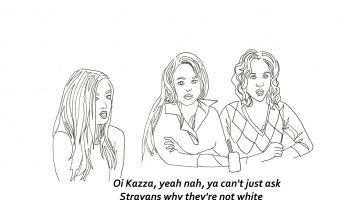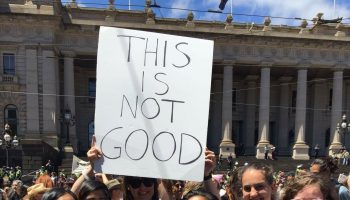It’s been 228 years since Europeans arrived in our country without signing a treaty. The three forms of legal occupation at the time of European arrival were an empty land, negotiated land and invaded land. The British settlers (and politicians today) say an empty land was settled, the High Court says ‘Terra Nullius’ was invalid, the wise sages of talk-back radio say it’s in the past, and Indigenous people say Australia remains a crime scene – so who’s right and who’s wrong? Can we just patch this one up with another apology, without any legal ramifications in the true spirit of reconciliation?
This year the Daniel Andrews government continued its social justice rampage from refugees and safe schools, to genuine engagement with Indigenous people, but is all this too good to be true? Or are they just sick of losing seats to the Greens? At this rate, he’ll be pouring the sand through the traditional owner’s hands whilst Bob Hawke packs his beer bong for finishing the legacy he was ousted for.
It started February 3rd when State Indigenous Affairs Minister Natalie Hutchins called an open meeting with the Indigenous community to discuss self-determination and constitutional recognition. A meeting of this kind hadn’t occurred in over 20 years; 200 hundred people attended and 200 others streamed online. In brief, the Indigenous community made it very clear they unanimously rejected the notion of Constitutional Recognition, seeing it as a government distraction and wished to establish the framework to engage in treaty conversations.
Over the next month, this momentous occasion received only a blip of mainstream media attention and a Dandrews tweet telling us it was on the table. The State government waited a month for the press release, playing down any Recognise rejection as “unconvinced”, but most importantly following up on the Treaty debate, announcing state wide forums to shape the conversation starting in May, 2016.
Treaty is an incredibly touchy subject for any government to chase. If you can remember the 1980s land rights scare campaigns, they claimed a small percentage of ‘Aborigines’ would be given ownership of the majority of this prosperous country. Middle class Aussies were coerced into believing some kind of Indigenous 1% would conspire to unfairly distribute Australia’s wealth. The iron ore irony, that these campaigns were funded by the mining industry, is not lost on Indigenous people today. In the state of Victoria there aren’t big business party donors looking to derail talks, so we may just see further discussion.
It’s hard to look past treaty as some kind of costly reparation power move from a right wing perspective, but the symbolic side of this negotiation for Indigenous people to set the agenda is the crux of self-determination. I say symbolic because almost every existing treaty around the world has been broken in some form. The real goal here is bringing Indigenous people to the table in genuinely shaping our country. This isn’t a new concept either: politicians love the inside/outside tent metaphor almost as much as they love paying the black representative (that they invite inside the tent) a government salary.
Problematic to all of this is that a treaty is not simply government vs. ‘Aborigines’, but a sovereign leader and 300+ nations negotiating. As prominent activist Robbie Thorpe said, “Take me to your leader” – who is the sovereign signatory? Dandrews will be taking a bold step looking to bridge this unknown. How do you unify 300+ nations so they are they all on the same page? The alternative solution is a federal government offering recognition that Indigenous people are in fact … Indigenous people. This is a poor consolation prize for the rights that many have fought so hard for. I personally have followed the campaign for many years and agree with the intent and scope of what it hopes to achieve, but it cannot come before or detract from what is required.
20 years from now we could celebrate the day a treaty was signed as the foundation of this country. The generic word ‘Aborigine’ would barely be used because people would understand the names of the lands, nations, and people whose history they were now a part of. Indigenous people would be empowered to engage in a society that was shaped by their culture. Nobody would turn up to your Sunday BBQ in blackface, because people would understand the invasion, discrimination, massacre and genocide of history. If the federal government still had a spare $150 million for a referendum to recognise after all that was achieved, we could change the constitution’s wording to state our country didn’t just have an Indigenous history, but that it was written into our future too.


